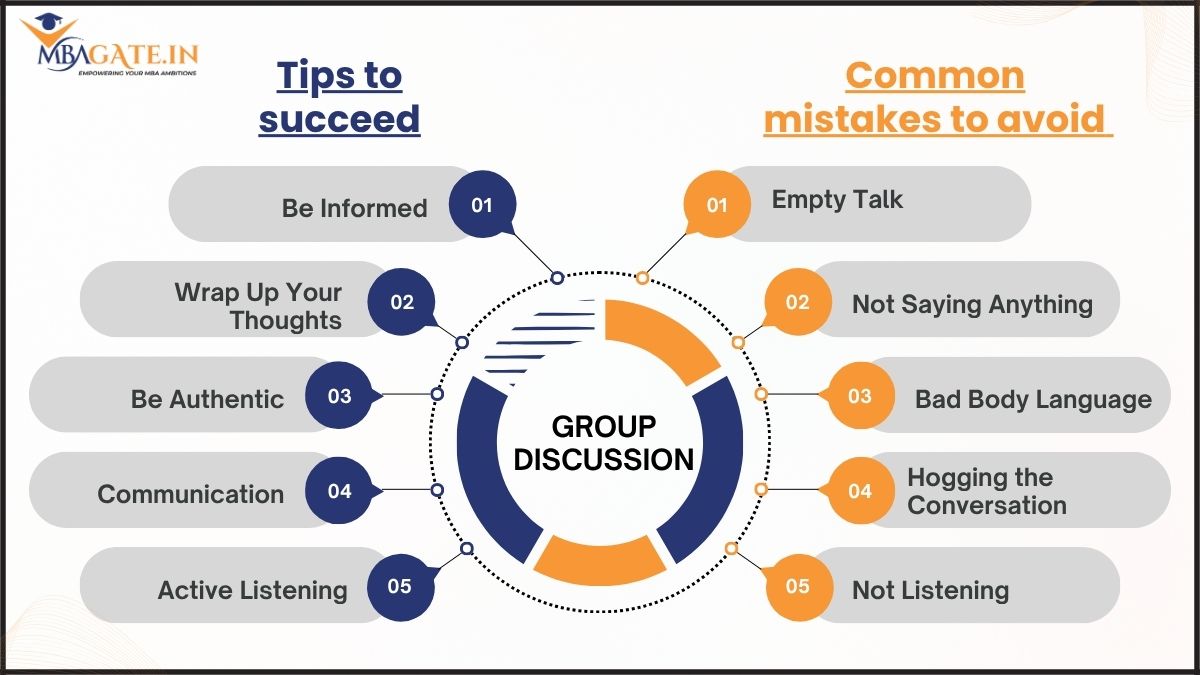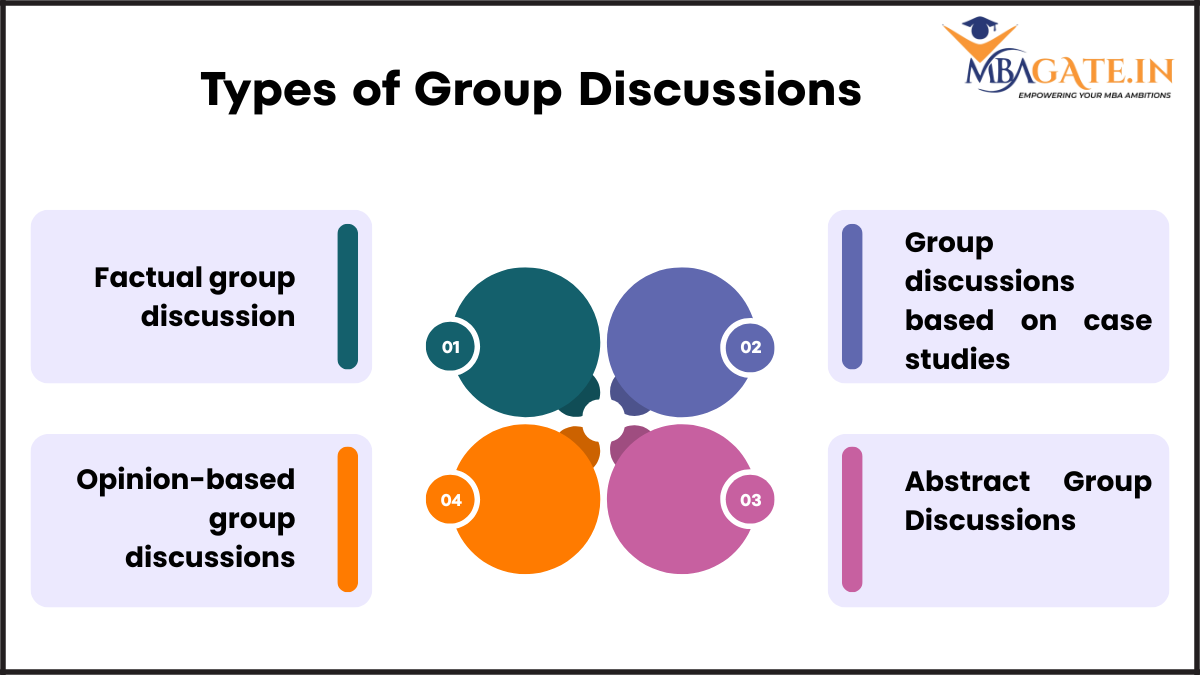What is Group Discussion: Types and GD Topics
Table of Content
-
- + more items Show less
As the name implies, a group discussion is an activity where a few people discuss or assess a topic collectively. Almost all significant decisions are taken following this type of discussion, but this method has gained popularity when choosing the mass manpower and during the final selection process for admission to the management and other institutes.

What is a group discussion?
Group Discussion (GD) is an exchange of ideas and opinions on an assigned topic taking place typically between a small group of 5 to 10 people. The main idea is to share and explore subject together instead of assessing it individually, getting to the collective solution or understanding, not being rigid with your own ideas and trying to understand the other's viewpoint also.
It is an important learning technique in a university and a useful methodology applied during final selection criteria and for many industries especially in hiring employees.
After giving participants instructions, the selection committee typically presents a topic to a group of five to ten candidates and then leaves them alone, only to observe until absolutely necessary.
Evaluators "are not there to see what you know but to observe how you contribute."
What is the objective of group discussion?
Positive thinking, teamwork, leadership potential and persuasion are just a few of the many traits that assessors look for in applicants.
Evaluate leadership potential: The evaluators notice if the candidates are initiating the discussions. Confident leaders must not dominate or present extreme opinions. They instead maintain a meditative stance about any topic. Smart and diplomatic people are required at the top level.
Test communication under pressure: In the management field, there will be many instances when business leaders have to make decisions instantly. This step shortlists the students suited for an MBA.
Assess teamwork and collaboration: The education in MBA colleges teaches students to work in teams. The GD round tests if the students can coexist with differing opinions, share a common space and build on each other’s ideas.
Gauge critical thinking: The topics given are such that the students are tested if they can think about the same topic from multiple perspectives. When questioned by a peer, will they be able to back their stance with a relevant example or data?
Emotional intelligence: This step tests how well students handle disagreements or counter opinions. To perform well in this round, students should not evaluate any issue based on emotions.
Authenticity: The views presented by the candidates should be built on a personal level and not just commonly held generic opinions. The speeches should not be memorised but should reflect genuine engagement. They promote natural thinking.
Filter incompatible candidates: The judges make sure to spot candidates who possess a strong ego or rigid opinions. Students must find the right balance between speaking and listening without interrupting their competitor’s speech. Those open to learning are selected through this round.
Group Discussion Process
It starts with the initiation, in which one member of a conversation has what he is talking there about "topic", beginning by introducing it to another participant. The second step is discussion, the essential part of the procedure. In terms of diversity, the works are full of opinions tersely put forth with arguments and that’s the issue. Active listening is really important, disagree or shift the points made by others in a kind of conversation. This stream must be managed by a facilitator or the group as a whole, to ensure that everyone has an opportunity to talk and the conversation does not, go too far astray. Then, as the discussion continues, the team transitions to summarising and conclusion.
A participant who is a “born organiser” summarises major arguments, agreement points and dissenting points. The objective is to synthesise the collective thought and where necessary, formulate a consensus or unequivocal path. At every point, effective conversations involve the attributes of respect, clarity, relevance and a co-operative focus on a collective purpose.
Tips to succeed in group discussion
Here are some valuable tips to crack the group discussion (GD), it is placed in order for your better understanding.
Be Informed: Come equipped with relevant facts, numbers and up-to-date examples.
Wrap Up Your Thoughts: Don’t present a point. Use a template such as PREP: Point (state your main idea) REASON (explain why) EXAMPLE (document of evidence to support it) POINT (reiterate your conclusion)
Be Authentic: Yes, sometimes it is safe to agree but be unique and come with well-reasoned ideas. Provide a new twist to the topic.
Communication: Speak clearly and with confidence, loud enough and speak at a moderate pace. Avoid filler words ("um", "like").
Active Listening: Now for the close-up and also keying in on others’ points. You’re not going to be able to contribute very effectively while you are simply waiting your turn to talk.
Body Language: Keep eye contact with the group, sit straight on your chair and make open gestures. Don't cross your arms or stare at the ground.
Don’t Dominate, Facilitate: Look to effectively participate rather than dominate the conversation. Ask quieter people for input: “What are your thoughts on this?”
Disagree Agreeably: If you disagree, do so respectfully. Say “Yes, I see what you mean, but here’s how I see it. “You will never go personal — and you will never interject rudely.
Keep on Target: Should the conversation go off track, calmly and gently guide it back. This shows leadership and focus. Try saying, "That's an interesting point, but why don't we get back to the core issue at hand regarding..."
Start, if you can — If you have something positive or strong to introduce as an opener, begin the GD to establish a tone of constructive criticism. But a bad start is worse than no start.
Summarise effectively: a really good concluding bonding section of all together, at the end we were left with a powerful last impression.
Basically, be prepared, articulate and cordial and a good team player who can contribute something to the discussion.

Common mistakes to avoid in group discussion
What not to do in a Group Discussion (GD) is as crucial as what to do. That way to parse, here are the critical mistakes to avoid, broken out for clarity.
Empty Talk: Do not chat for the sake of chatting. Fluff, repetition and ambiguous opinions will weaken your argument. There should always be a logic or a fact behind what you are saying.
Hogging the Conversation: GD is a group activity. Hogging the discussion, interrupting and not allowing peers to speak reflect weak team skills.
Not Saying Anything: Saying nothing implies you’re too insecure, less informed or disinterested to participate
Becoming Aggressive and Getting Emotional: Never attack the individual. Disagree only as to what is said, and never about the man. The second you get loud, snarky or emotional it’s game over.
Bad Body Language: Not looking your interviewer in the eyes, slumping or shaking your head too often and perhaps worst of all – crossing your arms. It signals disinterest or arrogance.
Not Listening: The most obvious body language of this is preparing to speak rather than responding and interacting with what they say. You can hardly make a smart case if you’re not listening.
Forcing Your Point: A GD is dynamic. Be flexible enough to change your position if someone makes a better point. Rigidity is holding on to an initial idea regardless of the evidence.
Off Topic: Derailing the conversation is a waste of time for everyone, plus it shows you can’t stay on topic.
Being too Aggressive About Being First Speaker: The worst possible is if it has to be a poorly researched or shaky opening. Only if you have a good, solid opening structure to start off.
Attacking instead of Building Other Discussions: You are trying to help make a discussion constructive, not just pointing out other people’s logical errors. This creates a negative tone.
Summarise Badly: If you have to summarise, be brief. A slanted summary that includes only things you have no objection to or an interminable one that restates the entire conversation will rebound on you.
By sidestepping these slip-ups, you communicate that you are a fair and valuable teammate who strikes the right balance.
Group discussion for MBA admission
The group discussion round conducted by MBA colleges like XLRI, MDI Gurgaon, SIBM Pune and IIFT is to assess the communication, knowledge and behaviour of the students. Previously certain IIMs used to conduct the Group Discussion (GD) round as a part of their selection process. However since then, all IIMs and some of the other B-schools have eliminated the group discussions round from their selection process, except for the Symbiosis Institute of Management and a few others.
This is a significant step before admission into one of the top management institutes in India. During this round, a group of 6-8 students is given a topic, they discuss their views for 10-20 minutes and present their views on it. The topic can be about businesses, economy, environment, social practices or a case study.
The group discussion round holds a certain weightage in each MBA college, this might vary from one B school to another. The evaluators grade students on predefined criteria such as their leadership skills, interpersonal skills, knowledge, clarity and confidence.
Group Discussions vs Personal Interview
Group discussions and personal interviews are conducted by many top MBA colleges for admission into their management programs. Both rounds revolve around personality analysis and the depth of knowledge of the candidates. When it comes to a GD, you are being tested on the team player and how well one can perceive others; a PI reflects how well an individual knows and perceives oneself. The table presents the different points and illustrates how MBA hopefuls should act in each round.

Types of group discussions
Factual group discussion – These conversations centre on specific data and facts. The participants must have a solid understanding of the subject and provide reliable information and proof to back up their claims. These practical group discussions assess a candidate's ability to process information and analyse everyday subjects or socioeconomic problems.
Opinion-based group discussions – In this type of GD, students are assigned a topic on which they may disagree. In this discussion, the candidate will either agree or completely disagree with the candidates who spoke before them. Here, the candidate's persuasion skills, communication skills and manners, patience and knowledge of the subject etc. are evaluated.
Group discussions based on case studies- A case study or perhaps a real or hypothetical scenario is given to the group, and they are asked to work on it together and then discuss it. Their performance is judged on their ability to work as a team, understanding of the case and also on their analytical skills. Therefore, they aim to look for the qualities that the company manager possesses when they step into the leadership role.
Abstract Group Discussions- Philosophical or abstract concepts serve as the foundation for these conversations. Participants must think creatively and unconventionally in order to understand the subject. Example Topics: “Red vs. Blue,” “A Journey Without a Destination,” “Time is Money.” Creativity, abstract thinking and innovatively linking ideas and concepts required to succeed in this type of group discussion.
Group discussion topics
As previously mentioned, group discussions are used in many prestigious companies to choose large numbers of employees. They are also used in university or college admissions reviews, particularly in management colleges. The subjects of group discussions may change depending on the organisation or college's requirements for admission to a specific stream. There are numerous subtopics within the GD topics:
Current affairs-based GD topics for 2025: Under this category many GD topics can arise pertaining to issues facing the country and the world:
Political Situation in Bangladesh:
Political Situation in Nepal
UN still relevant to solve global problems
Russia-Ukraine War
Israel-Palestine Conflict
India-China Relations in the Last Decade
Violence in Manipur
Law and Order Situation in West Bengal
Business and economy-based GD topics for 2025: Any subject pertaining to businesses and the economy would fall under this heading and be of utmost importance in the GD held during the management institutes' final selection process.
USA Tariffs on India
GST Reforms 2.0
Reduction in Income tax
Globalisation and its effect on local economies
The future of electric vehicles
Is an MBA necessary for success in business
The future of cryptocurrency
E-commerce vs Traditional retail
Social issue-based group discussion topics: Any topic which would have a direct impact on general public directly would be included in this category.
Impact of Social Media on Youth
Gender equality at the workplace
Smart Cities and Urban Development
Lifelong Learning Importance
Online Learning vs Traditional Classroom Learning
Development of hill areas: Creating environmental imbalance
Increasing Population in Metros
Cyberbullying and Online Harassment
Abstract-type group discussions: Philosophical topics or abstract-based topics are included in this group.
Smart Work vs Hard Work
Only constant thing is change
Red vs Blue
Happy vs Successful
Haste Makes Waste
Do deadlines destroy creativity?
Freedom is a myth
The world does not need religion
FAQs
A GD group typically consists of five to ten candidates.
The GD proceedings will be observed by two or three evaluators.
There is no simple solution to this, if you are well-versed in the subject, it is always preferable to speak first and establish the tone. If you are not, it is preferable to listen to a small number of participants first.
In contrast to group discussions, where everyone is competing with one another, personal interviews are one-on-one interactions with distinct marking systems.
Not much has changed. More significant are the topics of business, the economy and mergers and acquisitions.
One must exercise extreme caution to avoid being hostile. Depending on the subject, adopting an extreme stance is acceptable as long as it is appropriate and pertains to morality or ethics.
It typically lasts 20 to 30 minutes, though this varies based on how many people are in the group.




